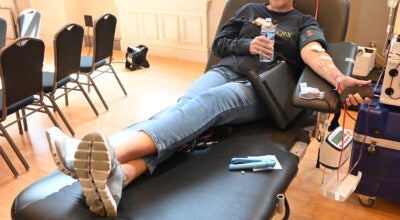Alternate prayer plan used during commissioners’ meeting
Published 12:05 am Tuesday, May 19, 2015
For the second time since the American Civil Liberties Union challenged its prayer practices, members of the Rowan County Commissioners on Monday chose not to audibly pray during a regularly scheduled meeting.
As a part of their regularly scheduled meeting, commissioners implemented a backup plan for opening invocations, listened to comments from attendees on the lawsuit and set a special called meeting for 6 p.m. on May 27 to discuss how to proceed in the lawsuit with The Gibbs Firm, who is representing Rowan County.
Pastor Michael Taylor, who serves as a chaplain to the sheriff’s office, provided a prayer as part of an alternate plan adopted after a lawsuit was filed challenging commissioners’ prayer practices. Instead of commissioners offering a prayer, the plan allows a chaplain, appointed once per year, to provide an opening invocation. In the 2013 plan, Taylor was selected as the first appointee. The only other time commissioners didn’t pray audibly during a regularly scheduled meeting was August 5, 2013, when former Commissioner Jon Barber asked for a three-minute recess, which commissioners used to pray amongst themselves.
Much like the prayers offered by commissioners, Taylor’s offering was largely free of any specifically sectarian words. Words used in Taylor’s prayer included: Lord, Lord God, our Father, our God and Christ. Among other things, Taylor prayed for wisdom among Rowan’s five county commissioners and members of society serving as law enforcement or first responders.
After Taylor’s prayer, Multiple members of the audience during a public comment period offered an opinion on how commissioners should proceed in a lawsuit that declared past prayer practices unconstitutional. Federal Judge James Beaty specifically mentioned the practice of commissioners being the sole providers of prayer in his ruling issued on May 4.
Three of the four speakers during public comment analyzed Beaty’s ruling and pointed out flaws in the decision.
La Resistance member Julian Torrey was the lone speaker who was against commissioners appealing the ruling. Torrey was cut off at the three-minute time limit in the middle of reading scripture.
“One fact is that Jesus Christ, himself, had a very emphatic position about prayers in public,” Torrey said.
Torrey subsequently read a scripture from Matthew 6:5.
“And when thou prayest, thou shalt not be as the hypocrites are,” Torrey read. “They love to pray standing in the synagogues and in the corners of the streets, that they may be seen of men.”
Other speakers included Rowan County residents Larry Wright, Larry Jones and his son Matthew Jones. All three spoke in favor of commissioners appealing the ruling.
“There’s nothing in the first amendment that gives the federal government via the legislative, the executive or the judicial branch the authority to dictate the prayer practices of any governmental body at any level,” Larry Jones said.
Larry Jones called a temporary injunction on prayer practices, which was in place until Beaty’s May 4 ruling, a censorship of prayer. Instead of censoring the prayers, Larry Jones said the May 4 ruling tries to eliminate them altogether.
“No matter how each of us feels about the traditional prayer practices of this board, we ought to be able to agree that’s it’s a local issue,” Larry Jones said.
His son Matthew Jones also urged the county commissioners to appeal the ruling. Matthew Jones quoted previous decisions from the U.S. Supreme Court as evidence that Rowan County Commissioners weren’t coercing attendees to pray during meetings.
“Stand for liberty, stand for reason,” Matthew Jones said.
The final speaker during Monday’s public comment period was Wright, who spoke about the cost of the prayer lawsuit.
So far, the only recorded cost related to the suit is $3,712.50 paid to County Attorney Jay Dees until May 2013. Since that time, Dees said he’s done additional work related to the suit, but the total cost, including previous invoices, wouldn’t exceed $5,000. The Gibbs Firm, which is representing Rowan County, isn’t charging for representation. Rowan County could be responsible for paying legal fees to the ACLU if it loses or decides not to appeal the case.
Wright said appealing the lawsuit is “far more important” than any previous feasibility studies conducted by the Rowan-Salisbury School Board or research done to locate county departments at the West End Plaza.
“Surely we can afford to appeal the judge’s ruling to see if we can get a good return,” Wright said “If not, what are we going to give up next? What’s the next right we’re going to give up? Jesus created the world, and what would possibly be wrong with praying in the name of the creator of the world?”
Wright encouraged commissioners to “do the right thing” and appeal the ruling.
Contact reporter Josh Bergeron at 704-797-4246.


